What Is Brand Value And Brand Equity And Why They Matter?
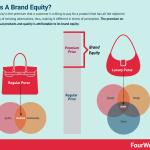
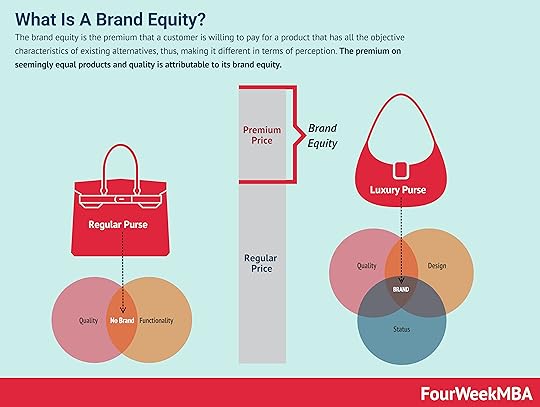
The brand equity is the premium that a customer is willing to pay for a product that has all the objective characteristics of existing alternatives, thus, making it different in terms of perception. The premium on seemingly equal products and quality is attributable to its brand equity.
https://fourweekmba.com/wp-content/uploads/2020/08/Brand-Equity.mp4Beyond the balance sheet and into the consumer’s mind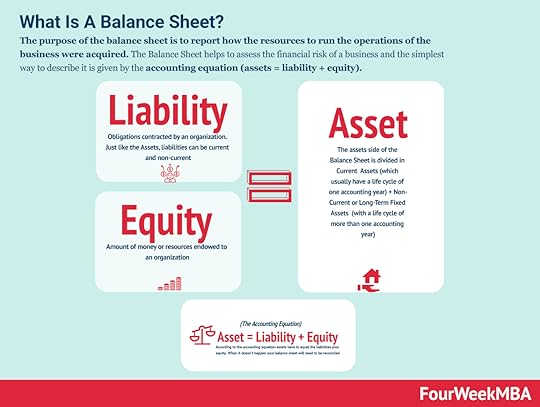 The purpose of the balance sheet is to report how the resources to run the operations of the business were acquired. The Balance Sheet helps to assess the financial risk of a business and the simplest way to describe it is given by the accounting equation (assets = liability + equity).
The purpose of the balance sheet is to report how the resources to run the operations of the business were acquired. The Balance Sheet helps to assess the financial risk of a business and the simplest way to describe it is given by the accounting equation (assets = liability + equity).If you speak to an accountant about brand value, he’ll call it “goodwill.” Indeed, in the accounting world, goodwill is a sort of leftover. A sum of money accountants can’t explain by matching existing assets with respective accounts, so they’ll lump it up under the umbrella of goodwill.
Goodwill usually arises when a company gets acquired with a plus, which can’t be explained in any other way.
However, if you ask a marketer what’s the brand, she/he’ll tell you “that’s everything!” It’s not like the marketer is trying to emphasize, quite the opposite. All the marketer does is about creating a brand, making a brand unique, making a brand “valuable.” They will ask for a marketing budget based on that brand.
Yet, when you ask the marketer, how much is our brand worth? The marketer will probably have a stunning face, almost like you were asking to put a dollar value on the Monalisa.
Between those two positions, there is a third one, which is that of brand valuation. More than science this is an art, which is in infancy. The attempt is to put a dollar value on a brand so that marketers can’t say a brand is worth like the Monalisa and entrepreneurs are finally happy to tell their accountants a brand is much more than just goodwill.
Understanding the difference between Brand Equity and Brand ValueFirst, you need to understand the difference between brand equity and brand value.
Brand equity refers to the importance of a brand for customers, while the brand value is the financial strength and significance of that brand. Both brand equity and brand value are estimates of how much a brand might be worth in the marketplace.
Therefore, brand value is primarily a financial estimate. Brand equity is a more holistic measure which comprises:
Brand LoyaltyBrand VisibilityBrand AssociationsInside brand valueA brand is the set of expectations, memories, stories and relationships that, taken together, account for a consumer’s decision to choose one product or service over another.
If the consumer (whether it’s a business, a buyer, a voter or a donor) doesn’t pay a premium, make a selection or spread the word, then no brand value exists for that consumer.
This is a great definition given by Seth Godin in 2009. And he continued:
A brand’s value is merely the sum total of how much extra people will pay, or how often they choose, the expectations, memories, stories and relationships of one brand over the alternatives.
While this definition is the best I could find. Putting a dollar sign on memories and stories is tough. Thus, brand valuation as a financial methodology has a more quantitative approach. That doesn’t necessarily mean a better approach.
A few argue that the things that can be measured might be those that count the least. Yet as we start measuring them, they become part of our conscious understanding of the world, which makes our world a set of metrics. This, in turn, makes us measure things that don’t matter.
Indeed, even though brand valuation starts from a compelling need to assess a brand quantitatively to explaining how valuable is a company in the marketplace. It might also end up simplifying too much a brand. For that matter, it is critical to understand that brand valuation is just an estimate. Thus, a reference number, not something to take as the absolute value of your brand.
At least tracking a brand value has multiple benefits:
Justifying marketing expenditures and activities based on a “clearer” ROITracking the growth trajectory of a brandBeing able to communicate more clearly the value of the brand to stakeholders (potential investors, shareholders and potential partners)But it might also lead to side effects:
Measuring the wrong metrics for a company’s brand successRemoving the focus from customers and placing it too much on metrics that don’t really impact the businessHaving said that, let’s see the methodologies available.
The approaches and methodologies used to compute a brand valueThere are several methodologies available to compute brand value:
Brand Equity Ten: things like Differentiation, Satisfaction or Loyalty, Perceived Quality, Leadership or Popularity, Perceived Value, Brand Personality, Organizational Associations, Brand Awareness, Market Share, and Market Price and Distribution Coverage Brand Equity Index: it takes into account three main aspects of Effective Market Share, Relative Price, and DurabilityBrandAsset Valuator: it accounts for Differentiation, Relevance, Esteem, KnowledgeBrand Valuation Model: also based on a few key financial metrics and other parameters to assess the value of a brandBrand Contribution to Market Cap Method: given by the asset value of the brand as a component of the company’s market valuationThose are the leading brand valuation methodologies. Each of those takes into account a different perspective and makes an assumption about what a brand is made of. Thus, each of those approaches has its limitations.
Brand equity and demand generationBrand equity is about mastering the desires, and perceptions of your customers, thus making them demand your product, and define their needs around it. Rather than start from existing pain-points, demand generation also focuses on changing the fundamental questions other brands ask.
For instance, where a brand might sell sport’s shoes because they are more comfortable than others. Companies like Nike tap into demand generation by inspiring people to give them meaning through sport. In short, rather than asking “is this shoes more functional?” Nike asks “are we making our customers feel they are part of a movement?”
That is how a shoe transitions from being a commodity to becoming a status quo.
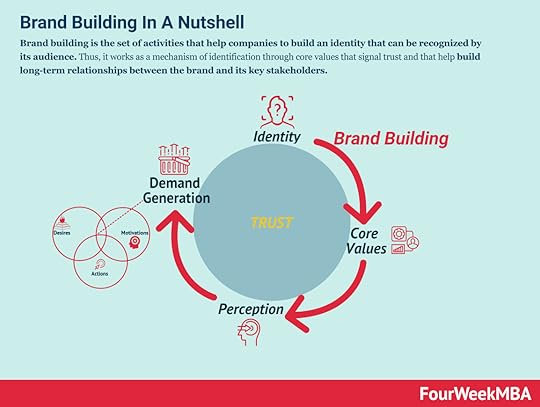 Brand building is the set of activities that help companies to build an identity that can be recognized by its audience. Thus, it works as a mechanism of identification through core values that signal trust and that help build long-term relationships between the brand and its key stakeholders.
Brand building is the set of activities that help companies to build an identity that can be recognized by its audience. Thus, it works as a mechanism of identification through core values that signal trust and that help build long-term relationships between the brand and its key stakeholders.
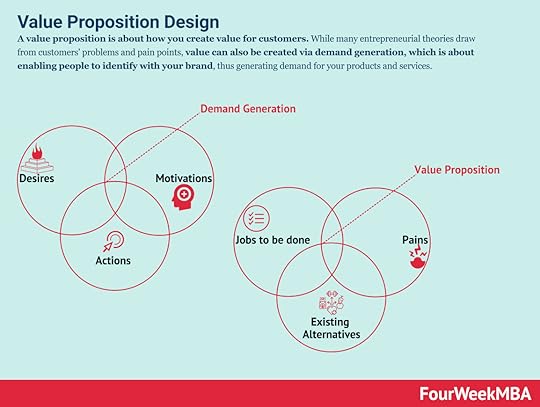 A value proposition is about how you create value for customers. While many entrepreneurial theories draw from customers’ problems and pain points, a value can also be created via demand generation, which is about enabling people to identify with your brand, thus generating demand for your products and services.
A value proposition is about how you create value for customers. While many entrepreneurial theories draw from customers’ problems and pain points, a value can also be created via demand generation, which is about enabling people to identify with your brand, thus generating demand for your products and services.
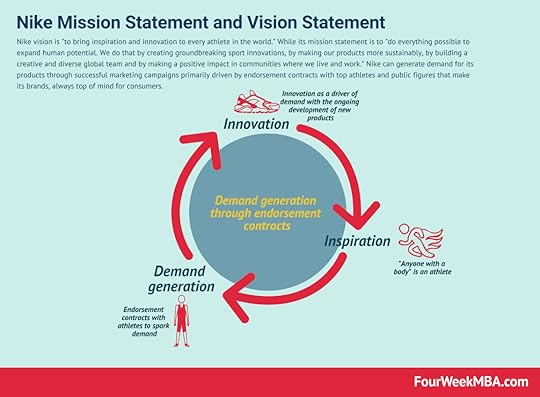 Nike’s vision is “To bring inspiration and innovation to every athlete in the world.” While its mission statement is to “do everything possible to expand human potential. We do that by creating groundbreaking sport innovations, by making our products more sustainably, by building a creative and diverse global team and by making a positive impact in communities where we live and work.”Other brands’ related conceptsBrand Positioning
Nike’s vision is “To bring inspiration and innovation to every athlete in the world.” While its mission statement is to “do everything possible to expand human potential. We do that by creating groundbreaking sport innovations, by making our products more sustainably, by building a creative and diverse global team and by making a positive impact in communities where we live and work.”Other brands’ related conceptsBrand Positioning
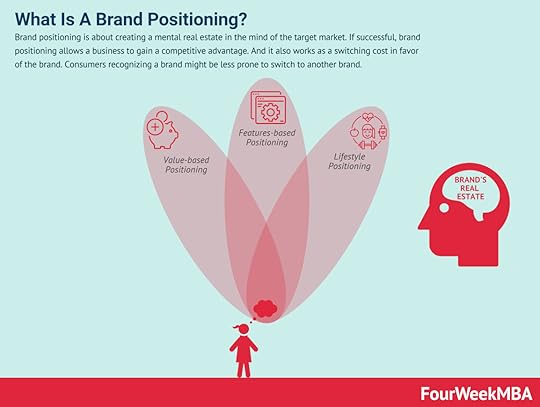 Brand positioning is about creating a mental real estate in the mind of the target market. If successful, brand positioning allows a business to gain a competitive advantage. And it also works as a switching cost in favor of the brand. Consumers recognizing a brand might be less prone to switch to another brand.Brand Awareness
Brand positioning is about creating a mental real estate in the mind of the target market. If successful, brand positioning allows a business to gain a competitive advantage. And it also works as a switching cost in favor of the brand. Consumers recognizing a brand might be less prone to switch to another brand.Brand Awareness
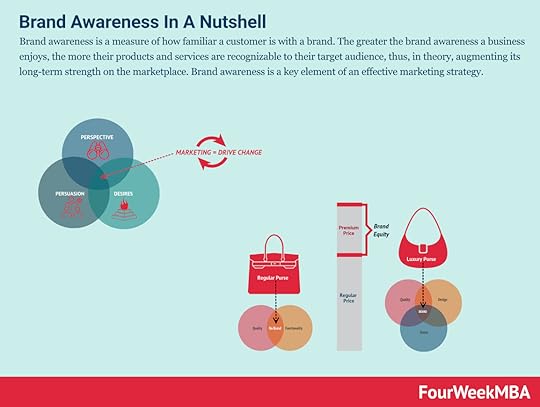 Brand awareness is a measure of how familiar a customer is with a brand. The greater the brand awareness a business enjoys, the more their products and services are recognizable to their target audience, thus, in theory, augmenting its long-term strength on the marketplace. Brand awareness is a key element of an effective marketing strategy.
Brand awareness is a measure of how familiar a customer is with a brand. The greater the brand awareness a business enjoys, the more their products and services are recognizable to their target audience, thus, in theory, augmenting its long-term strength on the marketplace. Brand awareness is a key element of an effective marketing strategy.Other resources:
What Is Business Model Innovation And Why It MattersSuccessful Types of Business Models You Need to KnowWhat Is a Business Model Canvas? Business Model Canvas ExplainedBlitzscaling Business Model Innovation Canvas In A NutshellWhat Is a Value Proposition? Value Proposition Canvas ExplainedWhat Is a Lean Startup Canvas? Lean Startup Canvas ExplainedHow to Build a Great Business Plan According to Peter ThielWhat Is The Most Profitable Business Model?How To Create A Business ModelWhat Is Business Model Innovation And Why It MattersWhat Is Blitzscaling And Why It MattersMarketing vs. Sales: How to Use Sales Processes to Grow Your BusinessCase studies:
The Power of Google Business Model in a NutshellHow Does Google Make Money? It’s Not Just Advertising!How Does DuckDuckGo Make Money? DuckDuckGo Business Model ExplainedHow Amazon Makes Money: Amazon Business Model in a NutshellHow Does Netflix Make Money? Netflix Business Model ExplainedHow Does Spotify Make Money? Spotify Business Model In A NutshellThe Trillion Dollar Company: Apple Business Model In A NutshellDuckDuckGo: The [Former] Solopreneur That Is Beating Google at Its GameThe post What Is Brand Value And Brand Equity And Why They Matter? appeared first on FourWeekMBA.



